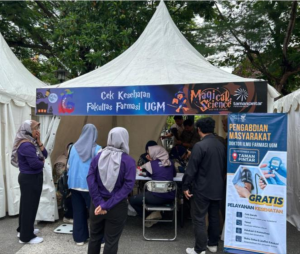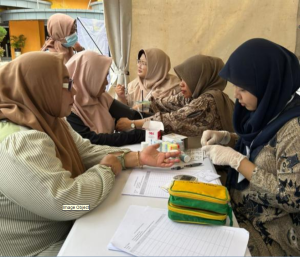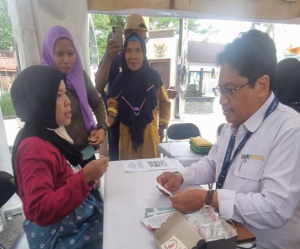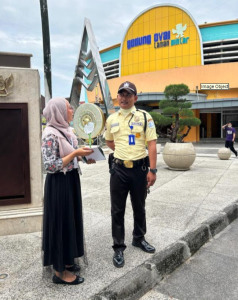The Doctor of Pharmacy Study Programme of Universitas Gadjah Mada (UGM) has a vision to become a pioneer of Doctor of Pharmacy education that is superior and innovative at the national and international levels, serving the interests of the nation and humanity imbued with Pancasila. To realise this vision, one of the missions is to carry out community service based on research results to solve national and humanitarian problems. The implementation of this mission is the implementation of community service by students of the Pharmaceutical Science Doctoral Study Program together with several lecturers which coincides with the 16th Anniversary of Taman Pintar on 16 December 2024. The Faculty of Pharmacy UGM, as a partner of Taman Pintar, has routine opportunities to fill activities that are beneficial to the community, especially visitors to Taman Pintar.
The community service activities include free health checks which consists of checking blood pressure, uric acid, cholesterol and blood sugar, consultations on examination results, drug education, and information related to self-medication. This series of activities aims to provide the community an opportunity to undergo health checks accompanied by pharmacists to provide education and information related to health conditions and drugs. In addition, with the provision of self-medication information, it is hoped that it can increase the community’s insight regarding the treatment of minor illnesses such as flu, cough, rhinitis, gastritis, and minor pain to buy medicine independently at the pharmacy. This activity supports the 3rd and 4th Sustainable Development Goals (SDGs). The third SDG is a healthy and prosperous life (good health and well-being), one of which focuses on the national health system. This community service activity is intended to improve public health so that the productivity rate of the community increases, which will affect the order of a prosperous and prosperous country. SDGs point 4, namely quality education, through this activity, it is intended that the UGM Faculty of Pharmacy, through educators and students, introduces direct learning in the community to create superior, innovative human resources who have a high sense of concern for the health of the surrounding community which is expected to have an impact on increasing healthy human development. 
This activity cannot be separated from the guidance of Dr. apt. Nanang Munif Yasin, M.Pharm. and apt. Anna Wahyuni Widayanti, M.P.H., Ph.D who are also technically involved in providing direct education to the community. This activity was carried out with other contributing lecturers, including Dr. apt. Nunung Yuniarti, S.F., M.Sc., Dr. apt. Purwantiningsih, M.Sc, apt. Woro Harjaningsih, S.Sc., Sp.FRS. and apt. Arif Rahman Hakim, M.Sc. The lecturers involved have Clinical and Community Pharmacy expertise so that the community gets more detailed education and information regarding drugs and their health conditions.
The flow of activities begins with students undergoing health screening, including measuring body weight and blood pressure and communicating regarding medical history, medication, and health complaints experienced by participants. Screening data is recorded on an examination sheet, which is then used as a reference for checking uric acid, cholesterol, or blood sugar levels. The examination results are consulted directly with a Pharmacy lecturer who also acts as a Pharmacist providing education and information as well as vitamin B-complex. Furthermore, participants are given information and education about self-medication through a booklet media to facilitate participants’ understanding of receiving health information. Of course, the drugs recommended in self-medication are over-the-counter drugs and limited over-the-counter drugs that can be purchased freely without a prescription at the pharmacy.
A total of 81 participants, consisting of 54 women and 27 men with an age range of 19-80 years, participated in this activity enthusiastically. The average blood pressure of partici pants in the normal category was 116/79 mmHg. Meanwhile, uric acid checks were carried out on 14 people, cholesterol checks on 41 people, and blood sugar checks on 26. The education provided regarding examination results includes the importance of regularly taking medication, especially for patients with long-term illnesses such as hypertension and Diabetes Mellitus (DM). For participants with examination results in the healthy category, education was still provided regarding preventing degenerative diseases and a healthy lifestyle.
pants in the normal category was 116/79 mmHg. Meanwhile, uric acid checks were carried out on 14 people, cholesterol checks on 41 people, and blood sugar checks on 26. The education provided regarding examination results includes the importance of regularly taking medication, especially for patients with long-term illnesses such as hypertension and Diabetes Mellitus (DM). For participants with examination results in the healthy category, education was still provided regarding preventing degenerative diseases and a healthy lifestyle.
Participants were also given information related to self-medication, or so-called self-medication, as additional insight for the community regarding drugs that can be purchased at pharmacies without a prescription to treat minor illnesses. Through a booklet containing self-medication, the community was educated about first aid and drugs that can be purchased without a prescription at pharmacies to treat and relieve symptoms of the disease.
One of the health check participants, Mrs. Dona from BNN Yogyakarta, said, “Free health check activities like this are very good and beneficial for the community, so the community knows their health condition.” This statement is proof of the participants’ enthusiasm for implementing this community service activity. The UGM Doctoral Program in Pharmaceutical Sciences is committed to improving public health through routine and sustainable community service activities to support the national health system by forming a healthy and knowledgeable community about medicine.
